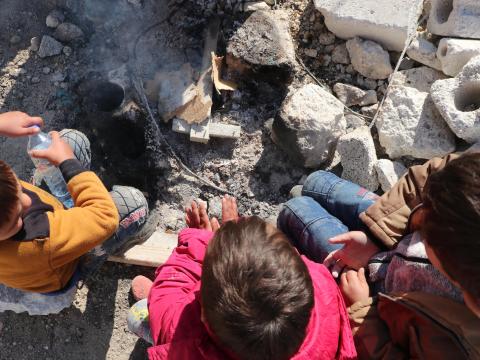Worst needs from earthquake in over a decade, will take over a generation to recover - World Vision

- World Vision speaks of deadliest earthquake in a decade, that has created need greater than any other natural disaster they have responded to in over a decade.
- World Vision warns it could take a generation for survivors to recover
- World Vision flags a humanitarian emergency that is catastrophic in historic terms, that requires an aid response that is historic in its generosity.
- International aid agency calls for full access and full funding – at speed - to all affected areas
Saturday, 11 February 2023 - International aid agency, World Vision, says the earthquake in Syria and Türkiye has created need greater than any other natural disaster they have responded to in over a decade.
The child focussed NGO, with over seventy years' experience in responding to emergencies, said that already dire and spiralling humanitarian conditions in Northwest Syria due to conflict - combined with the damage, limited access, loss of life and injuries - has meant the suffering as a result of this earthquake and aftershocks has been uniquely devastating.
Johan Mooij, World Vision Syria Response Director, says:
The Türkiye-Syria earthquake is serving up a cocktail of catastrophe from wide scale death, destruction and injuries, combined with the pre-existing levels of need in Northwest Syria following 12 years of conflict and the harsh winter conditions amidst mass displacement – to say it’s challenging is quite an understatement.
Beyond the spiralling death toll, this earthquake in Northwest Syria is unique because 4 million people were already completely dependent on humanitarian aid prior to Monday's disaster and access to this area was, and is, extremely constrained due to conflict dynamics.
“Entire streets and villages have been reduced to rubble, whole families killed, and millions left homeless. People already living in extreme poverty have lost what little they had. Prior to the quakes 6 or 7 people were sharing tents due to the scale of displaced from the conflict. Now it's 16 or 17 people in each tent. Children have been traumatised and will need psychosocial and physical support to deal with the impact of this disaster.
We have not seen suffering and devastation of this scale in over a decade. The impact is so enormous that World Vision warns that it could take a generation for survivors to recover, and maybe longer in Northern Syria where millions were already living on humanitarian aid with few prospects of their lives improving.
Mr Mooij adds:
“The amount of money and effort it will take to rebuild the structural damage could take a generation to get to pre-earthquake levels. This is especially the case in Northwest Syria where the humanitarian response plan has been consistently underfunded for most of the past 12 years. Hospitals and health clinics that survived the earthquake in Syria were already overstretched and underfunded – now they are unable to even keep the power on due to lack of fuel. Families who have been displaced multiple times already due to the Syrian conflict, have been displaced again. This is a humanitarian emergency that is catastrophic in historic terms, that requires an aid response that is historic in its generosity.
“We urge all governments to provide adequate funding in order to meet the chronic needs of the people in Syria and Türkiye and to be more flexible than ever when it comes to granting access. Security Council resolutions have given the mandate to open these closed border crossings before and we need them reopened to facilitate aid into Syria. This isn't a time for bureaucracy, it's a time for humanity. Holding back will only worsen the impact – and considering how bad things are now – that is something we cannot afford to even imagine. “
World Vision teams have been responding to emergencies for more than 70 years. They responded quickly on Monday to assess the most urgent needs on the ground and provided 17,000 litres of fuel to health facilities as well as search and rescue teams in Northwest Syria to enable them to keep running their operations transporting and treating the wounded. World Vision has also provided much needed heaters and fuel to more than 1,605 impacted households seeking refuge in collective shelters scattered across the Northwest. This will allow displaced families to keep the power running and stay warm until more temporary solutions are found. World Vision plan to distribute emergency relief items such as food, water, shelter and winterisation items, as well as medical supplies to several health facilities struggling to respond to growing needs.
ENDS
Notes to editors
For more information please contact: Hamzah Barhameyeh, World Vision Syria Response Communications Manager, Email: hamzah_barhameyeh@wvi.org